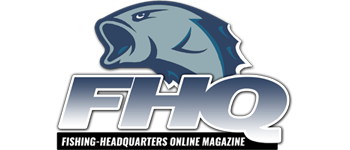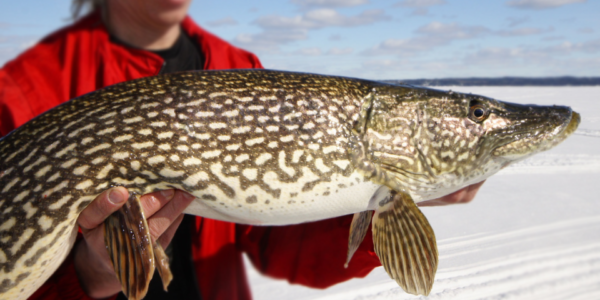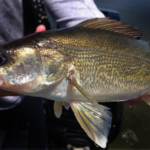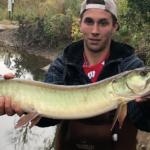The flag of the tip-up trips and the spindle screams as a big pike tears away through the narrow margin of water between the bottom of the ice and the lake bed. After a long hand over hand battle, the head of a big pre-spawn female comes through the hole. March is one of the best months for icing a giant northern. Locating concentrations of big fish as well as predicting their movements are going to be easier during the pre-spawn than any other time of the year. The fish are hungry, and action can be great. Finding MN and WI waters with legal seasons in March is the first step of the process. Learning were to find the fish and how to trigger strikes are the final pieces of the puzzle, and once it is together, exciting action is the reward.
In Wisconsin and Minnesota, pike can be fished legally all year in the MN/WI boundary waters of the Mississippi River (including backwaters), WI waters of Lake Superior and Lake Michigan (including bays, harbors, and some tributaries of Lake Michigan), and much of MN/Canada boundary waters. These waters all have huge pike as well, and all put out legitimate 20 pounders every year.
As the weather warms and the ice starts to rot, big pike begin to move near and into the areas in which they plan to spawn during ice out and just after. Most prime areas will be no deeper than 12′, and in some there maybe only 1-2′ of water below 2′ of ice. Prime areas include harbors, weedy bays, sloughs, backwaters, and channels leading into sloughs and backwaters. Sloughs and Harbors connected to the Great Lakes are often off limits to pike fishing in March, but the mouths of the connecting channels on the main lake side are fair game and amazing areas to contact huge numbers of migrating and hungry big pike. A bonus of this is that once pike enter larger sloughs, they tend to disperse; but when entering a narrow channel that leads to said slough, they are very confined to that small area. The areas pike will be moving into thaw earlier than other areas, are shallow, have good weed growth, are often soft bottomed, and have little or no current. Setting up within these areas or on a key migration route to these areas are the best bet.
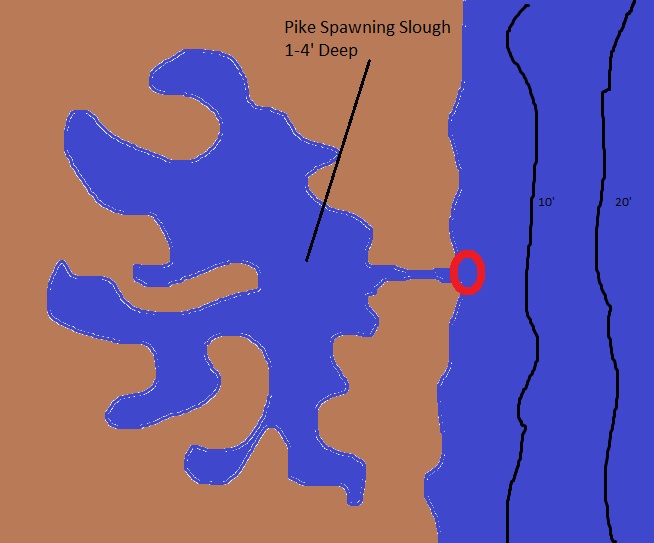
The entrance to a prime pike spawning area can be hot in March (best area to target is located within red outline). If the slough is “off limits”, it is the best and basically only option to target fish using that specific slough.
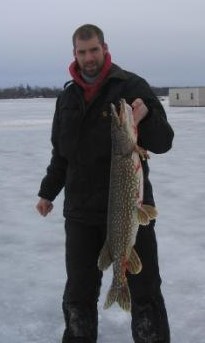
Clint Van Iseghem with a March late ice 44″ pike caught using
tactics described in this article.
Tip-ups baited with golden shiners, suckers, dead smelt, or dead ciscoes produce excellent results and allow a few anglers the ability to cover a lot of water or heavily saturate a smaller prime area. Baits from 3-12″ all have potential, but bigger baits will often take the biggest fish. When pike are finicky, smaller baits can out-produce larger offerings. Small premium treble hooks sizes 1, 2, 4, and 6 are what I use; either single or in a double hook quick strike configuration. I like to use medium (25-40 lb.) fluorocarbon or light (12-18 lb.) steel leaders, as big pike are just as tackle shy as any other fish. These transparent or light leader materials, combined with the smaller trebles, allow for me to take more strikes on any given day. I always hook dead and live baits in a manner that allows them to hang perfectly horizontal in the water.
For live baits, I hook them just under the skin in the middle of the dorsal fin, being careful to damage as little bone and muscle tissue as possible. This ensures the bait will remain as active as possible which will increase the number of strikes taken. Jigging is also effective and is very fun, as strikes can be very jarring. Large jigging spoons, airplane jigs, and jigging raps; either baited with a minnow or plain are very effective.
In water deeper than 4′, I keep my presentations 2-3′ off the bottom. In water shallower than 4′, I keep them half way from the bottom of the ice to the lake-bed. The shallower I set up, the quieter I have to be to keep from spooking fish. That being said, it is always a good idea to keep all noise to a minimum.
Big pike are a blast to catch through the ice and big females are at the heaviest they will be all year. This is a great way to target the biggest pike in any system. That being said, these large individuals are the future of the population and must be cared for properly. Please release them safely and unharmed and only keep those smaller than than 30″. Also, please be safe on deteriorating March ice (especially this winter). Have fun, see you on the water.
For more content, including video from Honesty Musky Television, Honest Musky Guide Service, Seminar Topics and Availability, and more articles; visit: www.honestmusky.com
Adam Glickman is an independent agent who shops across 9 different A rated insurance companies to best meet your MN and WI home, renters, auto, life, boat, and commercial insurance needs. For more information, contact Glickman at 612-750-0546 or at adam@lcisagency.com
